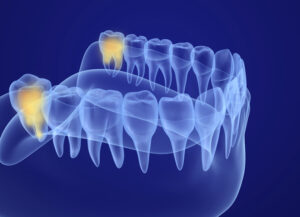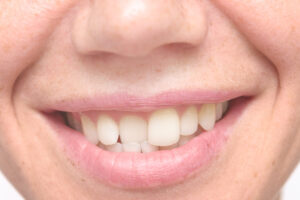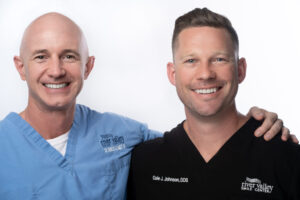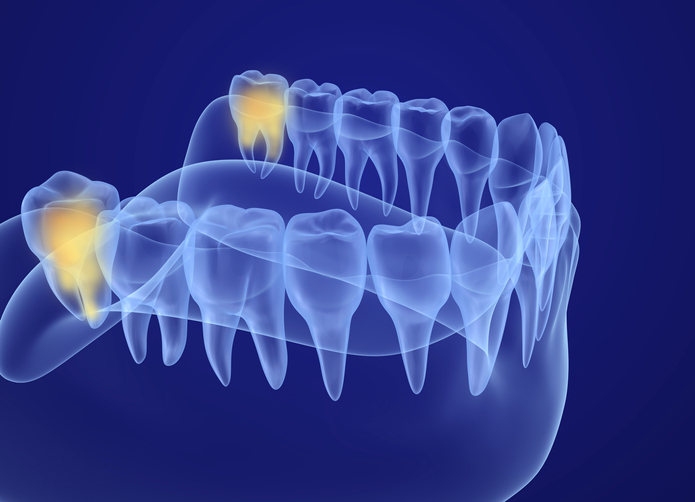Do Wisdom Teeth Have to be Removed?
Wisdom teeth are the third and final set of molars to come through (or “erupt”). It is estimated that around 75-80% of people will require wisdom teeth removal at some point in their life.
But is it “wise” for you to remove yours? Keep reading to find out!
History of Wisdom Teeth
Our third set of molars (known clinically as M3), received the name “wisdom teeth” because they erupt relatively late, usually in our late teens to early twenties, when we are older and (hopefully) wiser.
According to anthropologists, we most likely developed wisdom teeth to help us chew tougher foods like leaves, roots, nuts, and meats. However, our diets have changed a lot since our Paleolithic ancestors.
Due in large part to the Industrial Revolution of the 18th and 19th centuries, our diets now consist mostly of softer, carbohydrate-based foods. In other words, we no longer need our wisdom teeth as much as our ancestors did.
But there is an even more important side effect from these softer diets. Because the foods we have been chewing for the past 270 years are softer, our jaws and faces have become increasingly smaller over time.
Smaller faces mean we have less room for our teeth – especially the third set of molars in the back of our mouth. That’s where removal comes in.

Why Wisdom Teeth Are Removed
There are numerous reasons why wisdom teeth sometimes have to be removed. Misalignment (or dental malocclusion) and tooth impaction are the most common reasons, but even if your wisdom teeth grow in properly, they may still need to be removed later in life.
Tooth Misalignment
Due to our smaller faces, we sometimes don’t have enough room for our wisdom teeth to erupt properly. This can result in the teeth growing horizontally or at an unnatural angle.
Unlike our front-facing teeth, misaligned wisdom teeth aren’t an aesthetic problem due to their positioning. However, they can lead to other problems – namely dental crowding, which can damage nearby teeth, our jawbone or even our nerves.
Due to these risks, wisdom teeth are sometimes removed even if they do erupt fully. When they don’t erupt fully, the need for removal is even greater.

Tooth Impaction
When a tooth is “impacted,” it means that it fails to erupt completely into the gum (usually because there is not enough room in the mouth). This leaves a small opening around the tooth that bacteria can enter, potentially leading to infection.
Impacted teeth, especially impacted wisdom teeth, are also harder to clean, which can increase the chance of tooth decay and gum disease (or periodontitis). To reduce these health risks, it is recommended to extract impacted wisdom teeth.
Because wisdom tooth impaction and/or misalignment is so common, medical professionals often recommend removing wisdom teeth as a precautionary measure, ensuring you won’t have to deal with these risks later down the line.
Other Reasons for Wisdom Tooth Removal
If you are one of the lucky 20-25% of people whose wisdom teeth grow in correctly, you may still need to extract your wisdom teeth later in life.
Because wisdom teeth are so far back in the mouth, cleaning them is difficult. If you don’t regularly see a dentist, over time there is a high chance that your wisdom teeth lead to health problems such as gum disease, cavities, cysts, tumors, and infection.
If these health problems surface, you may need to have your wisdom teeth extracted.
The Case for Preventative Wisdom Teeth Removal
It is common for dentists to recommend wisdom tooth extraction as a precautionary measure, prior to their eruption. There are a few reasons for this.
Quicker Recovery Time
When you are young, your wisdom teeth roots are not fully developed and your bone density is lower. This makes the recovery time for tooth extraction lower than if you were to have it done later in life.
Impaction and Misalignment are Common
As we discussed earlier, our faces have been growing increasingly smaller since the Industrial Revolution due to our softer diets. Because our diets remain soft (and are arguably becoming softer), improper wisdom tooth eruption is becoming increasingly more common.
Around 75-80% of people will not meet the medical criteria for keeping their wisdom teeth. This means if they do keep them, they will likely run into some of the health problems outlined above.
When you combine the high health risks of keeping wisdom teeth with the lower recovery times of early extraction, it makes sense that many dentists recommend preventative removal.
If you need help deciding whether or not to have your wisdom teeth removed, contact River Valley Smile Center in Fort Smith, Arkansas.
Common Wisdom Teeth Related Questions
Does everyone have wisdom teeth?
No. It is estimated that 2% of people are not born with wisdom teeth. If you are one of these 2%, you don’t have to worry about whether or not you should extract them!
How many wisdom teeth are there?
Most people have four total wisdom teeth. However, just as some people don’t have any wisdom teeth, some have one to three (or even more than four).
Do you have to extract all four wisdom teeth?
No. The lower two wisdom teeth are the most commonly extracted because they are not involved in biting and often contribute to pericoronitis (swelling and infection of the gum tissue).
How much does wisdom teeth removal cost?
Extraction costs vary depending on a number of factors, namely whether or not the wisdom teeth have grown in yet. Simple extractions can range between $75-$200 per tooth, while surgical extractions can range from $225-$600.
How long after wisdom teeth removal can I eat?
For the first 48 hours after extraction, you must eat soft foods such as yogurt. After this 48 hour period has passed, you can begin to eat progressively harder foods.
Can you drink alcohol after wisdom teeth removal?
You must wait at least 24 hours after extraction before consuming alcohol to prevent bleeding and other complications.
About River Valley Smile Center
When you walk through the doors at River Valley Smile Center, you become part of our family. Our doctors, Dr. Liggett and Dr. Johnson treat each patient as if they were part of their immediate family. Call us today to set up you appointment!


